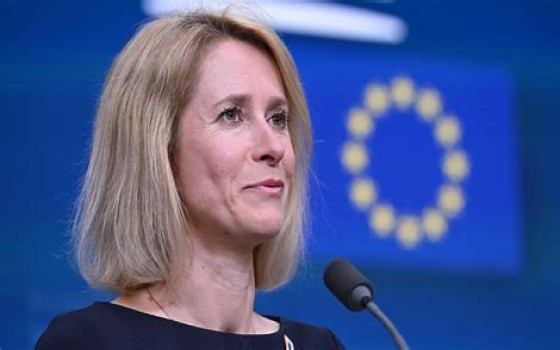
The European Union brought Syria, Israel, and Palestine together at a meeting of Mediterranean neighboring countries for the first time in 11 years. Today, it is discussing options for addressing the occupation's human rights violations in Gaza.

- Europe and Arabs
- Tuesday , 15 July 2025 12:45 PM GMT
Brussels: Europe and the Arabs
On the sidelines of a meeting of European Union foreign ministers today in Brussels, European Union High Representative for Foreign Affairs and Security Policy Kaya Kallas said that the situation in the Middle East is of course on the agenda, and we will discuss Gaza and the situation there. We have reached a common understanding with Israel to tangibly improve the situation on the ground. But it's not about the document, it's about its implementation. She added, "We see some positive signs regarding the opening of border crossings, we see some positive signs regarding the rebuilding of power lines, the provision of water, and the arrival of more humanitarian aid trucks. But of course, we need to see more to see a real improvement in people's lives on the ground.
Then we will also discuss Iran. It is of course in our interest to return to the diplomatic track and negotiations. We are ready for that, and we also have the Joint Comprehensive Plan of Action, and deadlines for the re-imposition of sanctions. Then we will discuss the Georgia file." In response to journalists' questions about the situation in the Palestinian territories and whether Israel has done enough, the European official said, "The situation in Gaza is still very bad. It is catastrophic - the humanitarian situation. As long as the situation does not truly improve, we will not have done enough. We are clearly in a situation where there is no ceasefire, and that is why it is difficult to provide that aid. But we urgently need to work towards that to help people, because we do not know how far the ceasefire really has reached." Regarding the options presented to member states, is there one that is more acceptable among them? She said, "The list of options has been presented, and we will discuss it." But I can't predict the course of the discussion. I think the last time we had a discussion, the main focus was that we urgently need to improve the situation of people on the ground. That was the main goal. I think that's the main focus. The statements came the day after the ministerial meeting of the Mediterranean neighboring countries. Callas said, "This southern ministerial meeting is a historic event, as we have Israel and Palestine here. Syria is also at the table—for the first time in 11 years.
Of course, the meeting is intended to discuss the situation in the Mediterranean, what more we can do, and common issues: security, such as maritime security, as well as economic cooperation. And then, the regional situation. And, of course, the situation in Gaza.
In this regard, I can say that we have reached an agreement with the Israelis regarding the provision of humanitarian aid to the people of Gaza. But of course, it's not just about the agreement, it's also about its implementation.
We see some good signs of more trucks entering, more supplies for the people of Gaza, but we know that this is not enough. We must make more efforts to implement what we agreed on on the ground, to improve the situation on the ground.
Of course, Iran was also discussed, and how we see the situation. For us, the goal is to work on a diplomatic solution and resume talks on nuclear issues, not just the nuclear issue, but also other issues we have related to Iran." The European Union fielded a number of questions, including the following:
Q: Regarding Gaza, you stated in your statement last Friday that the European Union is ready to coordinate between the stakeholders in humanitarian aid on the ground. We have not seen this kind of coordination in concrete terms, because we see daily, and the people of Gaza are being killed.
Answer: As I said, the situation is very dangerous, and that is why we need to see real improvement on the ground. An agreement on paper is one thing, and implementing this agreement is another. This is what we are seeking. We are not seeing sufficient improvement on the ground. We need to truly see that this, all of this—what we agreed upon—is also happening.
Q: A meeting of the Foreign Affairs Council on Tuesday. You will discuss the options on the table. Do you think that after the agreement between the EU and Israel on increasing humanitarian aid, the situation will be different in the Foreign Affairs Council? Answer: “I was asked to present a list of all the available options. So, it is up to the member states to discuss how to deal with these options. Everyone has emphasized their desire to see an improvement in the situation on the ground for the people, and this is the question we will ask: We need to see real improvement on the ground.” The issue of Israel's human rights violations in the Palestinian territories has been a major source of controversy in the capitals of the European Union countries during the past period, and some called for the suspension of the partnership agreement between the European Union and Israel to force the Israeli occupation to stop the repeated violations of human rights in the Palestinian territories. Member states asked Kaya Kallas to present possible options for dealing with this issue.












No Comments Found